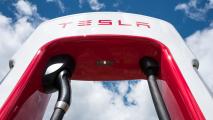Nuclear power is going mini. Former SpaceX engineers are creating a portable microreactor that is lightweight and cost-effective, calling it the “world’s first portable, zero-emissions power source.”
It was originally a project imagined for Mars, but the team decided Earth needed it more (or, at least, sooner). So, they formed a company called Radiant to continue to develop the microreactor. Once ready, it could provide instant power to hard-to-reach places and quick installation in populated areas.
Why this matters: “In some areas of the world, reliance on diesel fuel is untenable, and solar and wind power are either unavailable or impractical,” Jess Gehin, Chief Scientist at the Nuclear Science & Technology Directorate at INL, said in a statement. “Clean, safe nuclear microreactors are emerging as the best alternative for these environments.”
Unlike diesel generators, it doesn’t require frequent fuel deliveries, since the fuel in the portable microreactor can last more than four years.
Battelle Energy Alliance, the contractor that manages operations at Idaho National Laboratory (INL), is collaborating with Radiant on this project.
Indeed, home generators emit more pollutants than trucks and industry combined. They also pose a more significant risk to human health, because they are located in or near a person’s house and run for long periods. Engineers and startups are looking for low-cost, portable solutions: like solar-powered batteries in Nigeria, microgrids in a box, or hybrid solutions that could maintain local power during grid outages.
Radiant’s portable microreactor could be a clean solution to a range of power challenges. The portable microreactor is better for the environment without compromising on performance.
It is small enough to fit in a shipping container.
It can be deployed in remote regions where fossil fuel-powered generators would ordinarily be employed. Plus, unlike diesel generators, it doesn’t require frequent fuel deliveries, since the fuel in the portable microreactor can last more than four years, reports Interesting Engineering.
“The nuclear industry can benefit greatly from aerospace technologies and software developments that have occurred over the past 20 years, and have not made their way into nuclear,” Doug Bernauer, co-founder of Radiant, told Power.
Give it just a little more time, and nuclear energy will be hitting the road.
Radiant: Bernauer was researching energy sources for a possible Mars colony when he saw the promise for the same kind of flexible, economical power source here on Earth. So, he teamed up with two other former SpaceX engineers and co-founded Radiant.
Their portable microreactor will produce over 1MW — enough to power 1,000 houses for up to eight years. Several microreactors combined could power an entire town. It uses an improved fuel that can endure higher temperatures than most nuclear fuels and doesn’t melt, allowing for safer operation. And it is small enough to fit in a shipping container and able to be transported by ship, air, or truck.
Radiant is one among many that are working on compact nuclear reactors. But, so far, none have revealed a truly compact, economical, and long-lasting portable microreactor.
We’d love to hear from you! If you have a comment about this article or if you have a tip for a future Freethink story, please email us at tips@freethink.com.






